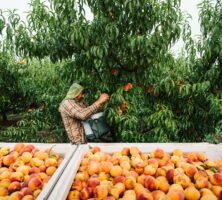Created in 1924 from Houston and Macon counties by the state legislature, Peach County was Georgia’s 161st county and the last county to be created. (In 1932 Milton and Campbell counties merged with Fulton, leaving the final number of counties in the state at 159.)
Peach County is located in the heart of central Georgia, 100 miles south of Atlanta and 25 miles south of Macon. The county comprises 151 square miles. According to the 2020 U.S. census, the population was 27,981.
Georgia’s youngest county took its name from the peaches grown there and is the self-proclaimed “Peach Capital of the World.” Samuel Henry Rumph lived in the area and launched Georgia’s peach industry after he developed the Elberta peach variety, named for his wife. The Peach Regional Rodeo and the Georgia Peach Festival celebrate the county’s most famous crop. In the 1920s the Peach Blossom Festival attracted thousands of people from all over the world. The peach craze lasted until the Great Depression, but the county still claims peaches as an essential aspect of its agriculture.

In the early 1800s the Creek Indians used the area as hunting lands, and their first contact with white settlers came in the 1820s. The first white settlers were from the Carolinas, and they settled west of the Ocmulgee River. By 1821 the United States acquired the land by treaty, which was extended at Indian Springs in 1825.
Fort Valley was an early Indian trading post in the area, which at that time was part of Crawford County. After arriving in Georgia as a private soldier in the War of 1812 (1812-15) and developing a career as an Indian trader, James A. Everett helped to found the town of Fort Valley and was its first commissioner and postmaster in 1825. Despite the name, no military fort ever existed in the town. In fact, when Everett applied to establish a post office there, his application requested that the name be “Fox Valley,” which was misread as “Fort Valley.” Everett married into the Creek Nation and became a wealthy planter, soon to be joined by other planters from South Carolina, who brought cotton to the county in 1832.

Today the seat of Peach County, Fort Valley was officially incorporated in 1856, although the town’s main institutions had been in existence for a couple of decades. The other incorporated town in the county is Byron, named for Lord Byron, an English Romantic poet. The Fort Valley Academy was founded in 1836, and the Wesley Manual Labor School was founded in 1837. They were joined in 1840 by Fort Valley United Methodist Church. The Fort Valley Female Seminary was founded in 1852, thirty-four years before the first public schools opened in the county.
The Civil War (1861-65) brought little action to Peach County. Military hospitals operated in the communities of Buckern and Gamble, and the Oak Lawn Cemetery in Fort Valley holds the remains of twenty unknown soldiers who died in a train wreck three miles north of town. The prewar mayor of Fort Valley, Charles D. Anderson, was wounded and captured at the Battle of Antietam, in Maryland, but he was later exchanged for Union prisoners of war. He returned in 1864 to Georgia, where his troops experienced heavy casualties in a battle against Sherman’s troops.
As early as the incorporation of Fort Valley, residents pushed for the creation of a new county. The Flint River formed a natural barrier to Macon and Crawford counties, and the courthouse in Perry, the seat of Houston County, proved to be a difficult journey. The state legislature first approved the creation of Peach County in 1922, but it required the approval of Georgia voters, who initially defeated it at the polls, only to change their minds two years later.
Founded as the Fort Valley High and Industrial School in 1895, Fort Valley State University is a historically Black college. Part of the University System of Georgia, the school has the state’s second-largest campus in terms of land, with nearly 1,400 acres.

The most famous employer in Fort Valley, as well as one of the largest, is the Blue Bird Body Company, founded in 1927. Known for its yellow school buses, the company also houses a museum, where tourists can see the original Blue Bird number one.
The American Camellia Society, founded in 1945, maintains its national headquarters at Massee Lane Gardens in Peach County. The gardens, added to the National Register of Historic Places in 1980, feature nine acres of camellias.













